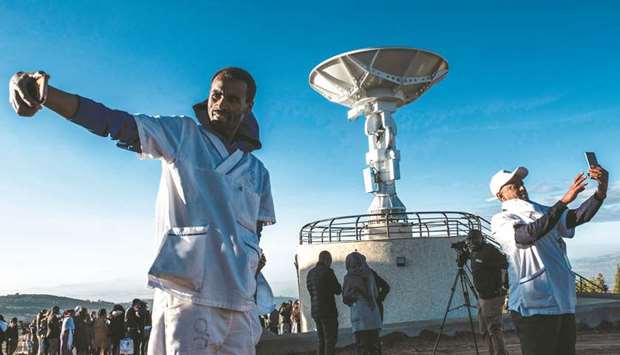Ethiopia’s first satellite was sent into space yesterday, a landmark achievement for the ambitious country that also caps a banner year for Africa’s involvement in space.
A Chinese Long March 4B rocket hoisted the first Ethiopian Remote Sensing Satellite (ETRSS-1) aloft from the Taiyuan space base in northern China.
Scores of Ethiopian and Chinese officials and scientists gathered at the Entoto Observatory and Research Centre outside the capital, Addis Ababa, early yesterday to watch a live broadcast.
The 70-kilogramme satellite was developed by the Chinese Academy of Space Technology with the help of 21 Ethiopian scientists, according to the specialist website africanews.space.
It will send back data of the environment and weather patterns in the Horn of Africa — a boon for a country dependent on agriculture and forestry and vulnerable to flood, drought and other climate perils.
“This will be a foundation for our historic journey to prosperity,” Deputy Prime Minister Demeke Mekonnen said in a speech.
It is the eighth launch of an African satellite this year, topping the previous record of seven in 2017, according to Temidayo Oniosun, managing director of Space in Africa, a Nigeria-based firm that tracks African space programmes.
“We can say that 2019 is pretty much the best year in the history of the African space industry,” Oniosun said.
The launch makes Ethiopia the eleventh African country to have a satellite into space.
Egypt was the first in 1998.
All told, 41 African satellites have now been launched — 38 from individual countries and three more that were multilateral efforts, Oniosun said.
None of those launches has taken place from African soil.
China covered most of the satellite’s $8mn cost, according to an official involved in Ethiopia’s space programme who spoke on condition of anonymity because he was not authorised to disclose details of the project.
The country’s space programme was originally championed by private individuals, who formed the Ethiopian Space Science Society (ESSS) in 2004.
Paulos Alemayehu, a longtime member of the group, said many were at first sceptical of the organisation’s ambitions to develop an Ethiopian satellite.
“They were saying, ‘In a country where tap water is not even reaching the upper stories of buildings, what the hell are you talking about?’” he recalled.
Paulos credited Prime Minister Abiy Ahmed for taking a special interest in the programme and for encouraging the partnership with China when he served as minister of science and technology in 2015 and 2016.

People take selfie pictures in front of a satellite antenna during the ceremony for the launching of the Ethiopian Remote Sensing Satellite (ETRSS) in Entoto Observatory and Research Centre in Addis Ababa, yesterday.
